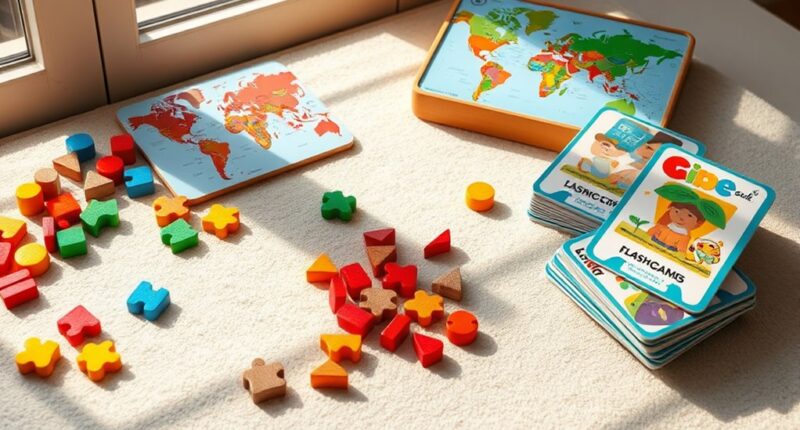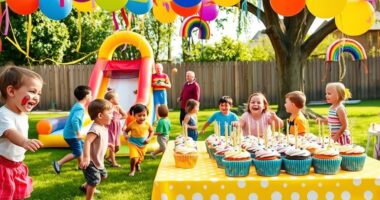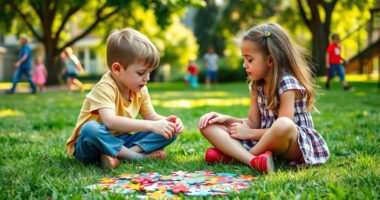Educational games and puzzles make learning enjoyable and fun! They sharpen your cognitive skills, enhance memory, and improve problem-solving abilities. These activities also foster creativity and emotional resilience while reducing stress. Engaging with puzzles helps develop spatial reasoning, vital for success in math and STEM fields. Plus, they encourage collaboration and critical thinking. If you’re curious about how to effectively integrate these tools into your learning experience, there’s even more to explore!
Key Takeaways
- Educational games and puzzles enhance cognitive skills, including problem-solving and critical thinking, making learning more engaging and effective.
- Activities like puzzles improve spatial skills and promote emotional regulation, supporting overall mental health in students.
- Collaborative games foster teamwork, enhance executive functions, and provide opportunities for social interaction, enriching the learning experience.
- Themed puzzles can align with curriculum objectives, reinforcing concepts and serving as formative assessments to gauge understanding.
- Regular engagement with educational games reduces stress and anxiety, promoting resilience and better academic performance among students.
Cognitive Development Through Puzzles
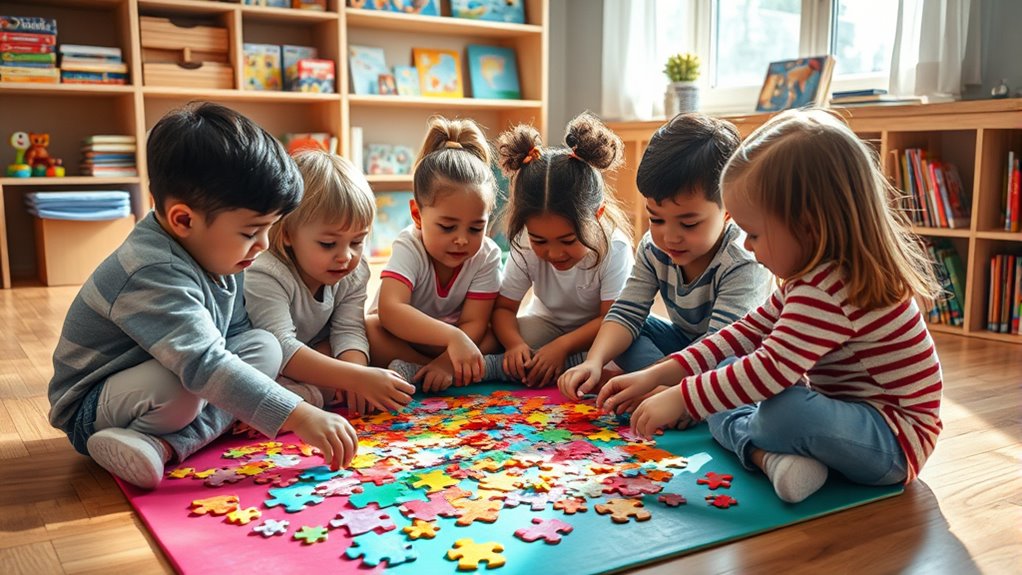
When you engage children in puzzle play, you’re not just offering them a fun activity; you’re also laying the groundwork for essential cognitive development.
Early puzzle play predicts the development of spatial skills in preschoolers, enhancing their ability to visualize and manipulate objects mentally. As children aged 4-6 solve puzzles, they improve their short-term memory, visual reasoning, and problem-solving abilities. This positive effect of puzzle playing allows both boys and girls to thrive in critical thinking and logic. The frequency and quality of their puzzle play directly influence cognitive outcomes, helping them reach important developmental milestones. Moreover, engaging in activities like puzzles can promote emotional regulation, which supports children’s overall mental health and decision-making skills. Additionally, incorporating brain-boosting activities into playtime fosters creativity and strengthens cognitive connections, making puzzles an excellent example of how educational toys can effectively support skill development.
Stress Reduction Benefits of Educational Games
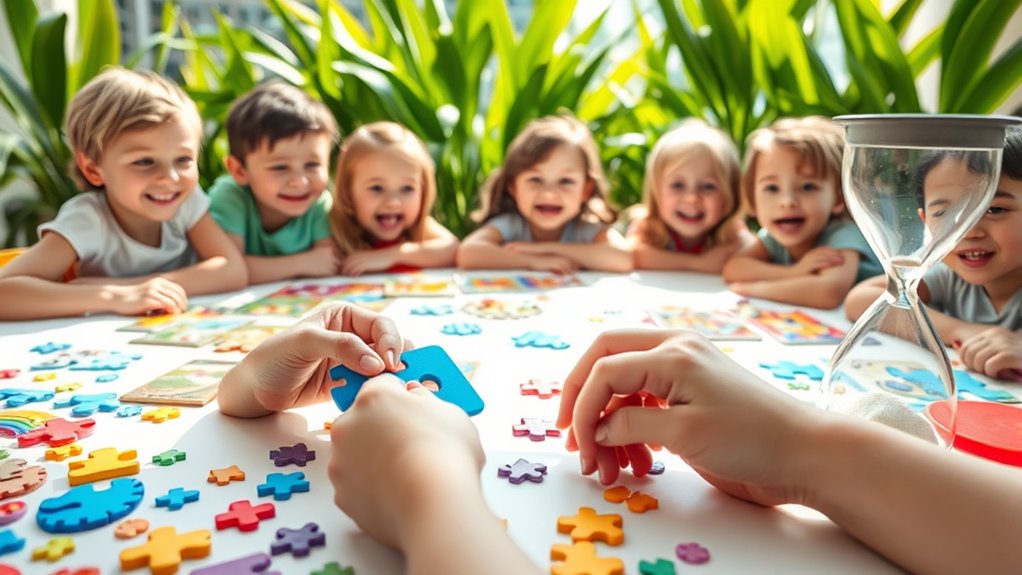
Educational games offer a powerful way to alleviate stress, as they engage students in enjoyable activities that promote emotional awareness and resilience.
These games help you identify and manage your emotions, reducing stress while boosting your confidence through immediate feedback. By incorporating relaxation techniques, they provide tools for handling academic pressure effectively. Additionally, these games foster skills in alternative viewpoints, which can help students navigate stressful situations by considering different perspectives. Engaging in wellness retreats can also enhance these skills by promoting self-discovery and personal growth in a supportive environment. Recognizing soulmate angel numbers can further contribute to emotional well-being by providing insights into personal connections and readiness for love. Furthermore, incorporating healthier breakfast alternatives into your morning routine can provide the necessary energy and focus to tackle educational challenges throughout the day. Engaging in activities that promote emotional readiness can also significantly enhance your ability to cope with stress. Moreover, participating in these games can help develop a growth mindset that encourages resilience and adaptability in the face of challenges.
The enjoyment and motivation from gameplay counteract negativity, turning stressful study sessions into engaging experiences. Plus, the social interaction in team-based games fosters support, acting as a buffer against psychological stress.
Whether it’s reducing test anxiety or enhancing problem-solving skills, educational games equip you with stress management strategies that enhance your overall mental well-being, making learning not just effective but enjoyable.
Enhancing Memory Skills With Puzzles

Engaging with educational games not only helps reduce stress but also sharpens your memory skills through the challenge of puzzles.
When you tackle crossword puzzles or Sudoku, you actively engage multiple brain regions, reinforcing neural connections and boosting memory retention. These puzzles adapt to your skill level, keeping you challenged without overwhelming you. Recent research has shown that crossword puzzles can lead to greater cognitive improvement compared to other cognitive games. Additionally, engaging in activities that require analytical thinking can further enhance your cognitive capabilities. Regularly solving puzzles can also be likened to the way cold medications target specific symptoms to enhance overall well-being. Moreover, exploring fiber-rich foods like chia seeds can contribute to overall brain health, enhancing cognitive function and memory. Incorporating chia seeds into your diet can also provide essential nutrients that support brain function. Furthermore, the consistent practice of solving puzzles can be compared to how drinking celery juice in the morning can enhance overall health benefits.
Regularly solving puzzles enhances cognitive functions, strengthening neural pathways that improve memory access. You’ll notice better problem-solving and vocabulary skills, which aid memory recall.
Plus, consistent engagement can delay cognitive decline as you age. So, immerse yourself in these fun activities and watch your memory skills flourish while enjoying the process!
Improving Hand-Eye Coordination
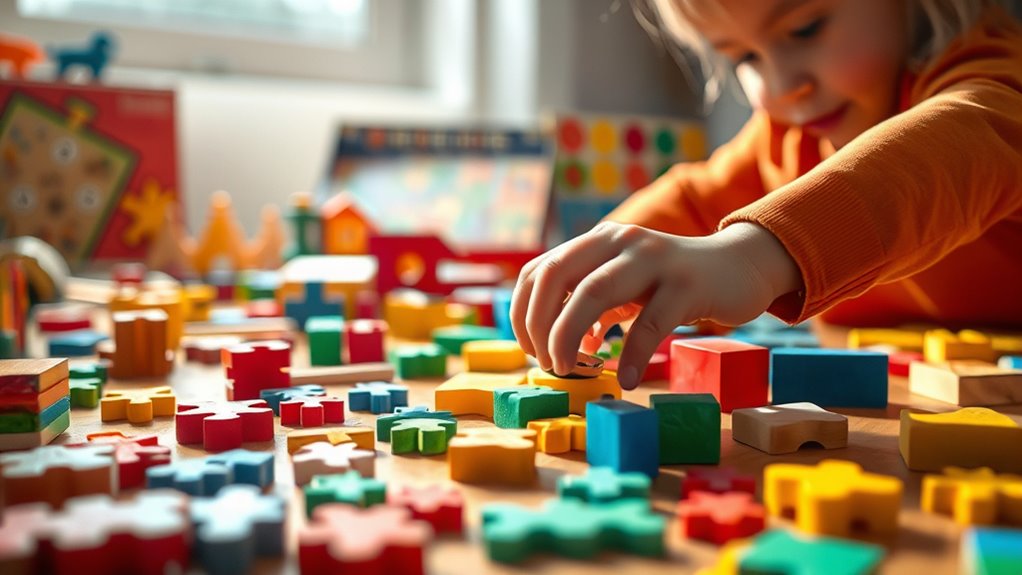
Hand-eye coordination is essential for many daily activities, and improving it can enhance your overall physical performance and cognitive skills.
Engaging in video games like Bubble Shooter and Fruit Ninja sharpens your focus and reflexes as you aim and slice. Geometry Dash and Super Hexagon challenge your quick reactions and spatial awareness. Incorporating hand-eye coordination games into your routine can provide a fun way to track your progress and enhance your skills. Additionally, participating in activities such as ride-on car toys can further improve coordination through active play and navigation of obstacles. Using toys like the Safer, Durable Wooden Sorting & Stacking Toys can foster developmental skills while enhancing hand-eye coordination. Regular practice of these games can also lead to better watering techniques for your indoor plants as you develop finer motor skills. Furthermore, incorporating principles from interior design can inspire creative environments that stimulate cognitive development. Adding nutrient-rich foods like chia seeds to your diet can also improve cognitive function, supporting overall skill enhancement.
Puzzles like jigsaw and tangram enhance your spatial skills through precise piece manipulation. Physical activities such as juggling or balloon volleyball also build your coordination.
You can try target practice or egg and spoon races for fun challenges. Adaptive games like wobble board exercises and shape sorting with obstacles further boost your skills.
Incorporating these games and activities into your routine will make improvement enjoyable and effective!
The Role of Executive Control in Learning
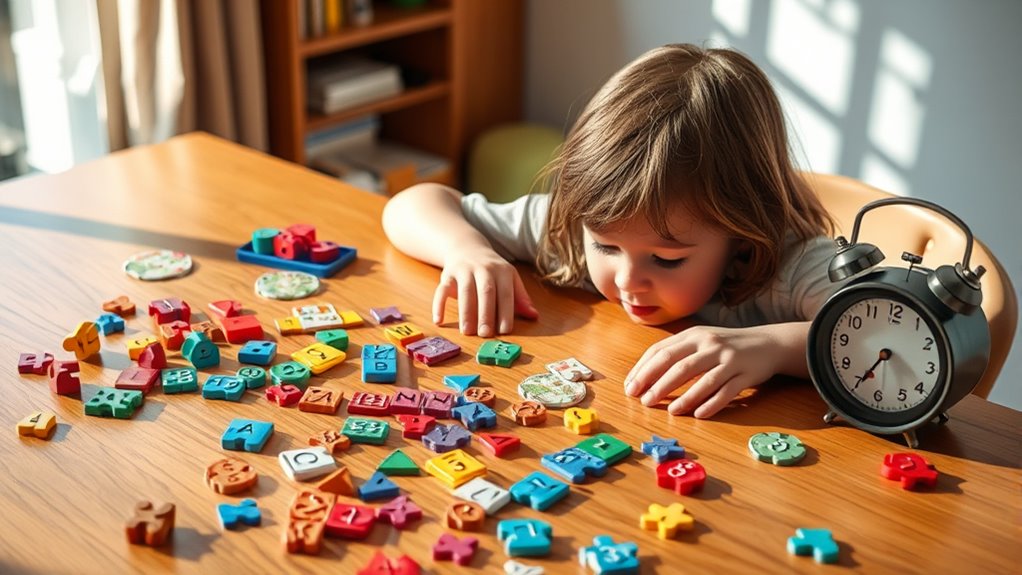
While you may not always realize it, executive control plays an essential role in how effectively you learn and process information. It encompasses core skills like cognitive flexibility, inhibitory control, working memory, emotional regulation, and planning. These skills form a foundation for academic success, helping you adapt to new challenges and stay engaged in learning. When these functions are well-developed, you’re likely to experience enhanced motivation and better outcomes in adulthood. On the flip side, difficulties with executive functions can lead to learning challenges and behavioral issues. Incorporating games into your routine can improve these skills by promoting critical thinking, sustained attention, and emotional control, making learning not only effective but also enjoyable. Furthermore, engaging in Collaborative games naturally engages students and provides opportunities for skill practice. Research shows that omega-3 fatty acids may further support cognitive function, enhancing your overall learning experience. Additionally, utilizing tools that leverage natural language processing can facilitate communication and enhance learning engagement. As with fashion trends, sustainable fashion emphasizes the importance of mindful consumption, which can also apply to how we approach educational resources and games. The integration of advanced technology in educational games can significantly boost executive control skills and overall learning effectiveness. Engaging in physical activities, such as cycling, can also enhance cognitive function by improving overall health and well-being.
Spatial Reasoning and Problem-Solving Skills

Building on the importance of executive control in learning, spatial reasoning emerges as an essential skill that greatly enhances your problem-solving capabilities. This ability allows you to mentally represent and transform objects in space, fostering innovative thinking. Engaging in activities such as puzzles and spatial games can train and improve these skills.
Strong spatial skills enable you to visualize complex problems, making them easier to analyze and solve. They’re vital for understanding mathematical concepts and performing well in STEM fields, like architecture and engineering. Additionally, astrological compatibility may influence how individuals approach problem-solving by enhancing interpersonal collaboration.
By developing your spatial reasoning, you’ll not only boost your problem-solving strategies but also enhance your overall cognitive performance, preparing you for real-world applications and challenging tasks. Furthermore, engaging with high refresh rates in gaming can further stimulate your spatial reasoning abilities by requiring quick mental transformations and problem-solving under pressure.
Fostering Creativity and Imagination
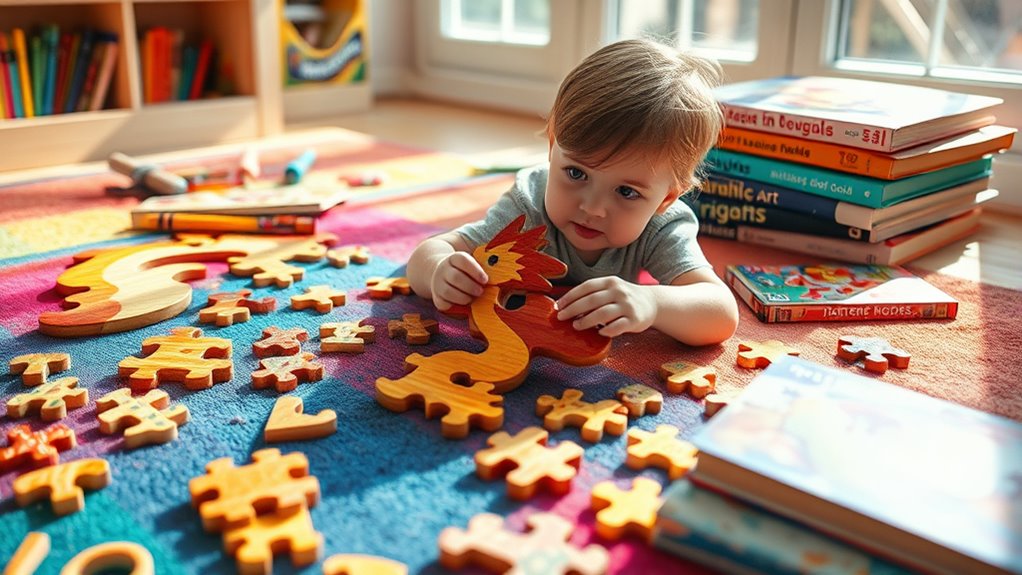
Creativity and imagination thrive in environments that encourage exploration and play. Educational games and puzzles provide engaging experiences that make learning enjoyable, allowing you to express your creative side.
Visual storytelling tools, like puzzles, let you craft unique scenarios, enhancing your imaginative thinking. Brainstorming activities, such as mind mapping and word association games, stimulate fresh ideas and innovative thoughts. Incorporating artistic elements into games further boosts your imagination.
Additionally, collaborative puzzles promote teamwork and creative problem-solving. Whether it’s through digital platforms or tactile experiences, these tools create dynamic learning environments that foster creativity and cognitive growth.
Strategies for Effective Puzzle Use in Education
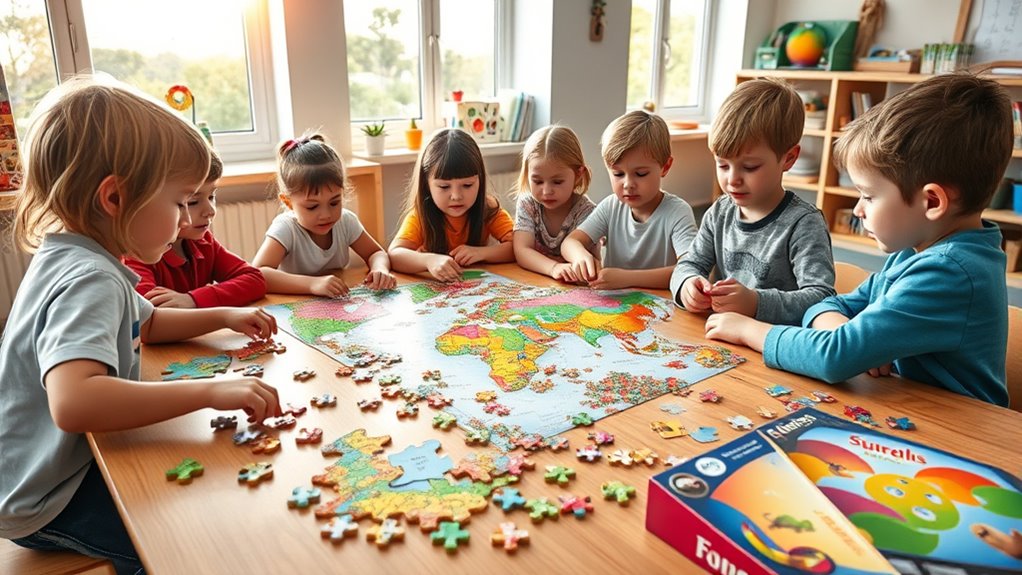
When you incorporate puzzles into your educational strategies, you unfasten a powerful tool for enhancing learning experiences. Puzzles sharpen your students’ problem-solving skills while making learning engaging and fun.
Incorporating puzzles into education enhances engagement, sharpens problem-solving skills, and transforms learning into a fun experience.
They can be used as bell ringers or as part of group discussions, promoting collaboration and communication. By integrating puzzles across various subjects, you reinforce key concepts and improve retention and recall.
Use themed puzzles to align with curriculum objectives, and consider them as formative assessments to gauge understanding. Additionally, puzzles create a hands-on learning environment, encouraging active participation without the pressure of traditional assessments.
With consistent use, like a daily puzzle, you’ll see improvements in critical thinking and perseverance among your students.
Integrating Games Into Learning Curricula
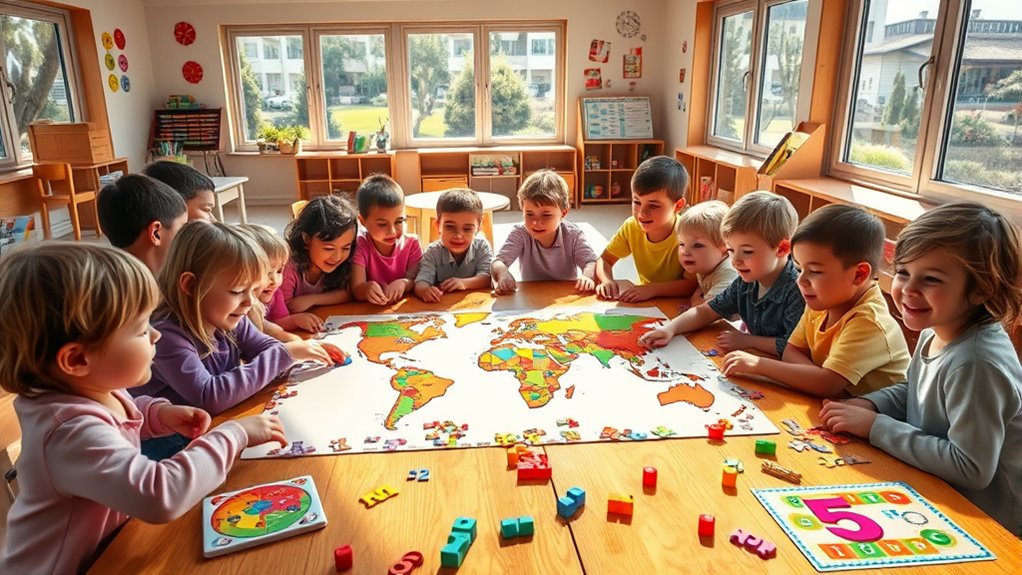
Integrating games into learning curricula offers a dynamic approach to education that captivates students’ attention and enhances their understanding of complex concepts. By incorporating games, you boost engagement, making learning enjoyable and interactive.
Games provide personalized learning experiences, allowing students to progress at their own pace while receiving instant feedback. They also foster critical thinking, problem-solving, and collaboration skills.
When selecting games, make certain they align with your curriculum and are age-appropriate. Start small by gradually integrating them into traditional teaching methods.
Create a conducive classroom environment and guide students during game sessions to maintain focus on learning objectives. With careful planning and assessment, you can effectively use games to enrich the learning experience.
Frequently Asked Questions
What Age Is Best for Introducing Puzzles to Children?
The best age to introduce puzzles to children starts around 10 months with simple shape sorters and large blocks.
As they grow, you can move to wooden puzzles between 12 to 18 months, which enhance problem-solving and fine motor skills.
For preschoolers, focus on basic number and alphabet puzzles.
By ages 3 to 6, you can introduce more complex puzzles that challenge their thinking and coordination.
Adjust the puzzle difficulty to match their developmental stage for maximum engagement.
How Do Educational Games Cater to Different Learning Styles?
Have you ever wondered how games can transform the way you learn?
Educational games cater to various learning styles by incorporating visual elements for visual learners, sound for auditory learners, and physical interaction for kinesthetic learners.
You’ll find collaborative gameplay engaging for social learners, fostering teamwork and communication.
Each game adapts to your unique preferences, making learning exciting and effective.
Immerse yourself in the world of educational games and discover your perfect learning match!
Are There Specific Puzzles That Enhance Emotional Intelligence?
Absolutely, there are specific puzzles designed to enhance emotional intelligence.
For instance, the RULER Method puzzle helps you recognize and regulate emotions, while the Mood Meter jigsaw visually represents different feelings, promoting discussion.
Engaging in cooperative puzzles fosters teamwork and empathy, enhancing your social skills.
Can Puzzles and Games Be Used for Adult Learning?
Puzzles and games aren’t just for kids; they’re like brain gyms for adults! You can sharpen your memory, boost problem-solving skills, and even spark creativity.
By engaging in these activities, you’re not just having fun, you’re literally rewiring your brain and enhancing your cognitive abilities.
Plus, tackling challenges together can create a fantastic sense of community, making learning feel less like a chore and more like an adventure!
How Often Should Children Engage With Puzzles for Maximum Benefit?
For maximum benefit, you should encourage your child to engage with puzzles regularly, ideally several times a week.
Consistent puzzle play enhances their fine motor skills, problem-solving abilities, and cognitive development.
Vary the difficulty as they progress to keep them challenged and motivated.
Make it a fun routine, and consider joining in to boost their enthusiasm and social skills.
This way, they’ll not only learn but also enjoy the process!
Conclusion
Incorporating educational games and puzzles into your learning routine is a win-win situation. Not only do they make learning enjoyable, but they also sharpen cognitive skills, boost memory, and enhance creativity. By using these tools effectively, you can unleash your full potential and tackle challenges with ease. So, don’t miss the boat—embrace the fun of learning through play, and watch how it transforms your educational journey!
